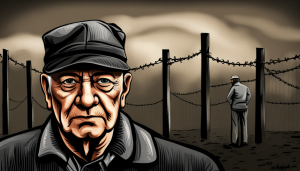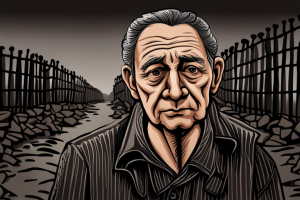This documentary film tells the remarkable life story of Leopold Engleitner.
Engleitner was one of Jehovah’s Witnesses and an Austrian conscientious objector who defied the Nazis during World War II.
The documentary explores Engleitner’s journey, highlighting his unwavering refusal to serve in the German army and swear loyalty to Hitler. As a result of his pacifist beliefs, Engleitner faced persecution, imprisonment and even the threat of execution.
“Unbroken Will” delves into the personal experiences and struggles of Engleitner, showing his unyielding determination to stand firm in his convictions and resist the pressures of Nazi ideology. The film sheds light on the immense courage and resilience displayed by Engleitner, who remained true to his principles even in the face of extreme adversity.
Directed by Bernhard Rammerstorfer, the documentary incorporates interviews with Engleitner himself, as well as those who knew him and were inspired by his story. Through these interviews and archival footage, viewers gain insight into the challenges Engleitner endured and the impact of his refusal to compromise his beliefs.
The film also explores broader themes of resistance, faith, and the power of conscience in the face of tyranny. Engleitner’s story serves as a testament to the strength of the human spirit and the importance of standing up for what one believes in, even in the most difficult circumstances.
“Unbroken Will – The Extraordinary Courage of an Ordinary Man: The Story of Leopold Engleitner” provides a compelling and inspiring narrative that educates viewers about a lesser-known figure of World War II resistance, shining a light on the individual acts of courage and persistence that helped shape history.
Persecution of Jehovah’s Witnesses in Nazi Germany: A Dark Chapter in History
 During the reign of Adolf Hitler and the Nazi Party in Germany, various groups were targeted for their religious, political, or social beliefs.
During the reign of Adolf Hitler and the Nazi Party in Germany, various groups were targeted for their religious, political, or social beliefs.
Among these were Jehovah’s Witnesses who experienced severe persecution due to their refusal to conform to Nazi ideology and their dedication to their faith.
Jehovah’s Witnesses are a Christian denomination known for their strict adherence to biblical principles and their rejection of political involvement and military service.
Their pacifist stance, refusal to salute the Nazi flag, and abstention from singing patriotic songs directly contradicted the Nazi regime’s agenda of complete loyalty and obedience. Consequently, the Jehovah’s Witnesses became a particular target of Nazi persecution.
Persecution and Repression
The persecution of Jehovah’s Witnesses began soon after Hitler’s rise to power in 1933. The Nazi regime viewed the Witnesses as a threat to their authority and sought to eradicate their influence.
The suppression campaign encompassed various forms of repression, including arrests, imprisonments, forced labor and even executions. What set this persecution apart from other groups was that in order to be released immediately, Jehovah’s Witnesses only needed to sign a declaration disavowing their worship of their God, Jehovah, and any future association with the organization.
Imprisonment and Concentration Camps
Jehovah’s Witnesses were often arrested for distributing religious literature, organizing meetings or refusing to participate in Hitler Youth activities.
Once detained, they faced brutal conditions in prisons and concentration camps. Estimates suggest that approximately 10,000 Jehovah’s Witnesses were incarcerated in these camps, enduring physical abuse, torture and even death.
Resistance and Resilience
 Despite the violent persecution, Jehovah’s Witnesses demonstrated remarkable resilience and unwavering commitment to their faith.
Despite the violent persecution, Jehovah’s Witnesses demonstrated remarkable resilience and unwavering commitment to their faith.
They continued clandestine activities, such as holding secret meetings and producing underground publications, even within the confines of concentration camps. Many Jehovah’s Witnesses died for their beliefs, becoming symbols of resistance against Nazi tyranny.
International Recognition
The persecution faced by Jehovah’s Witnesses gained international attention.
Despite being a relatively small religious group, they successfully fought legal battles against the Nazi regime and raised awareness of the religious intolerance and human rights violations carried out by the Nazis. Their courage in opposing the regime’s atrocities has since been recognized and honored worldwide.
Legacy and Historical Significance
The persecution of Jehovah’s Witnesses during the brutal reign of the Third Reich serves as a chilling reminder of the dangers of authoritarian rule and the importance of protecting freedom of religion and belief.
Their steadfast refusal to compromise their principles, even in the face of extreme persecution, stands as a testament to the power of faith and the resolve of individuals in